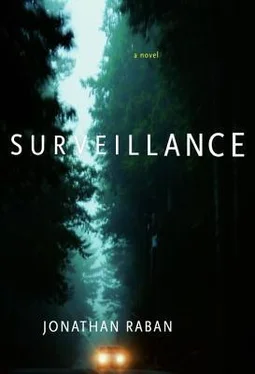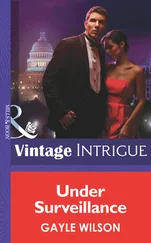At 6:40, he gave up, reached for the kimono, and, parting the drapes, peered out into the shadow-ridden half-light. It had begun to rain.
RAIN. LUCY, just back from the school run, coffee in hand, watched it from her window. She’d never seen such rain in Seattle. She was soaked from dashing across the street to the Acropolis, and the drive to school had been like a rough ocean-crossing in a small boat, with the Spider up to its axles in water half the time. She’d had to add a fresh set of dry clothes to Alida’s gym bag before they set out.
Seattle rain didn’t so much fall as precipitate in the air like mist, and you could walk an hour before feeling more than mildly damp. This was something else. From seven stories up, Lucy heard it hitting the streets, sounding like a forest fire and turning every surface on which it landed icing-sugar white. It was what she imagined an Indian monsoon must be like, or Noah’s flood — far beyond the wettest, windiest offerings the occasional Pineapple Express would blow through town once or twice a year. The whole city — or the very little she could see of it — appeared to be drowning in this astounding superfluity of water.
She was still watching when the phone rang.
“It’s Augie.” Just like that, as if they were old friends.
“D’you have this amazing rain, too?” she said.
“Yeah, it’s a frog-strangler.”
“I’m surprised the lines aren’t down.”
“No wind.”
That was true. It was falling in vertical bolts like densely packed steel bars. “I’m a dry-country Montana girl.” She was allowing herself to flirt a little. “I’m never cynical about rain. Even in Seattle I can’t separate it from the idea of goodness. Where I come from, every drop’s a gift. When people pray in eastern Montana, rain’s what they always pray for.” She had to raise her voice against the fiery crackle all around her.
“Then maybe some preacher got a tad too zealous on Sunday.”
Thinking of his “frog-strangler,” Lucy said, “In Montana, we’d call this a gullywasher.”
“ Gully washer. I like that.”
She could hear him, up there on the island in Thomas Jefferson’s library, adding “gullywasher” to his word hoard like a new postage stamp to a collection.
He’d looked at the forecast, he said, and they were calling for clear skies by tomorrow. “Why don’t you and Alida come for the weekend?”
How clever of him to recall her name. But then he was Mr. Memory, of course.
“And if you’d like to bring someone…”
A man, he meant. “No, it’s just Alida and me, and we’d love to.” Not quite true: Alida would have to be dragged, but Lucy didn’t want to ditch her with Tad again, and in any case he’d mentioned something about a weekend shoot for the MagiGro people.
“Minna will be so pleased. Minna loves children.”
He’d said that yesterday. Why be so emphatic about it? Because Minna actually didn’t like kids? In Lucy’s experience, too many positives were usually covering for a negative, and vice versa. “Alida will love meeting you,” she said. “She gets out of school at three on Friday, so if you like we could drive straight up to Whidbey then.”
“Wonderful. And plan on staying till Sunday. Does Alida like to kayak?”
“Who knows? I don’t think she’s ever tried it.”
“I’d get a kick out of showing her how.”
Listening to him on the phone, she could finally hear the ghost of old Europe in his voice — a faint guttural imperfection in his easy vernacular, like a hairline flaw in an otherwise perfect vase.
Putting down the phone, she marveled at what a snap this assignment was turning out to be. The prickly recluse was pure pussycat. She saw herself drawing him out, late at night, over wine, after Alida was in bed — and the piece would practically write itself. Remembering her elaborate campaigns to get face time with the likes of Gates and Cobain — the calls to friends of friends, the guileful negotiations with agents and PAs, the endless faxings of her cosmetically enhanced CV, the months-long waits for a reply — she wanted to give thanks for the sheer heaven-sent bounty of this frictionless commission: August Vanags had fallen into her lap, like rain.
The rain outside was getting even louder. Half an hour before, she’d just been able to make out the pale gray liquescent shape of the Smith Tower; now it was completely gone.
As she turned to the first page of Boy 381, she heard Tad’s trademark two-fingered triple tap on the door. “It’s open,” she called.
“I just swam to the store. That rain’s hot as bathwater.”
He looked like Neptune risen from the sea: a rather short and paunchy Neptune, not exactly godlike, but spectacularly dripping.
“You know a motorcyclist drowned out there? Down in Pioneer Square?”
“ Drowned ?”
“All the storm drains are choked, and water’s backing up behind the buildings. Apparently the bottom of King Street looks like Snoqualmie Falls. This biker guy — he was on a Harley — hit a submerged curb and fell off. People tried to get to him, but they were sloshing about doing no good at all, and when they finally managed to pull him out, he was dead. He probably wasn’t in too great a shape in the first place. He was an old hippie, you know, the white-ponytail faction. Poor sap.”
“Hadn’t you better get changed?”
“D’you have Lee’s number handy? We ought to call him. There’s water pooling in the stairwell under the skylight.”
She went out to look. It wasn’t “pooling,” with maybe a dozen large drops on the peeling oxblood linoleum. Tad fussed over trivia. Sometimes dearest Tad could piss the shit out of her.
“It’s nothing much,” she said. “And he’s such an obsessive snoop, he’ll discover it for himself soon enough. Do you really want to see him twice in twenty-four hours? I don’t.”
“I don’t know.” He looked up to the skylight, where a drip was swelling at the corner; it slowly grew, detached itself from the woodwork, and plopped onto the floor, where a real pool was forming in a perfect circle around Tad’s feet. He stood there holding a single forlorn plastic bag, his thick wool overcoat resembling a sopping black sponge.
“Honey, please, just for me, will you go get changed?”
Tad, still gazing upward, conceded. “Okay, I’ll find a bucket.”
Back with Augie’s book, she found it altered since her last reading, the lines of print now infused with his voice, his blue eyes, his military mustache, his prosthetic grin.
Where before she’d heard a boy speaking, in a pure, heart-tugging treble, she now registered a man’s dry tenor, and fancied she could tell when he broke for lunch, went to the bathroom, or finished work for the day. This new, slightly embarrassing intimacy between author and reader dampened her pleasure somewhat, but it was authentically him.
Here he was in Lodz, in 1943, a pinched and hungry little waif hiding in a bombed-out house with two older girl orphans who’d taken him under their wing. Right across the street, fifth floor to fifth floor, they saw a gang of jackbooted Nazis clearing Jews from a rooming house. One, an elderly man with bad arthritis, couldn’t rise from his chair, so the Nazis threw it and him right out the window into the street.
For a second, the old man remained sitting in his leather armchair, riding on air. Then he fell out of it. We heard two separate thumps in the street: one was the chair, the other the heavy ker-flup of a human body landing unevenly on cobbles. None of us could speak. We stayed there, motionless at the window, unable to tear ourselves away from the scene below, too fascinated by what we saw to fear detection by the German soldiers.
Читать дальше












